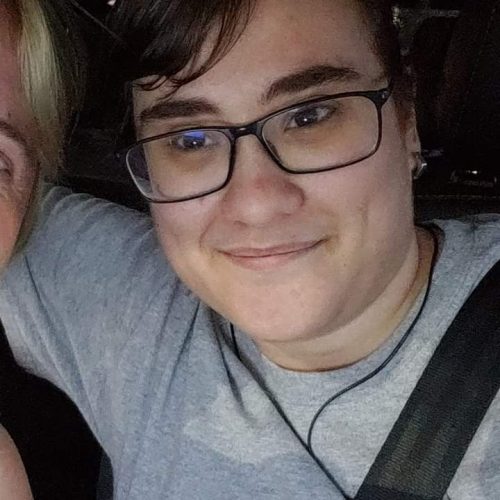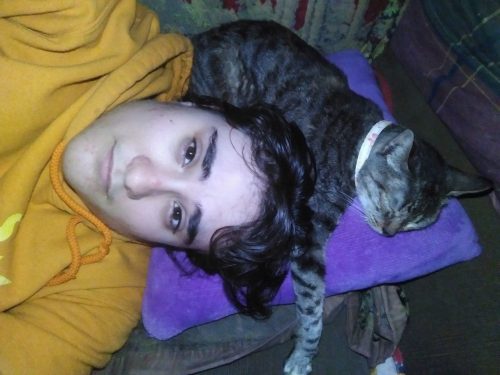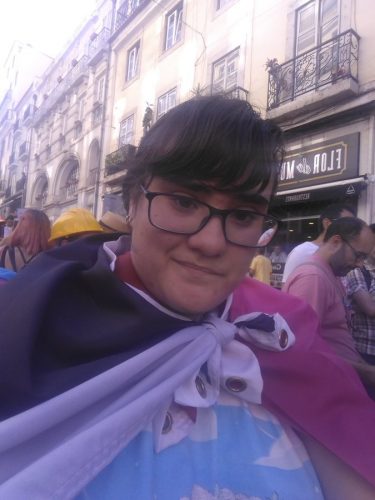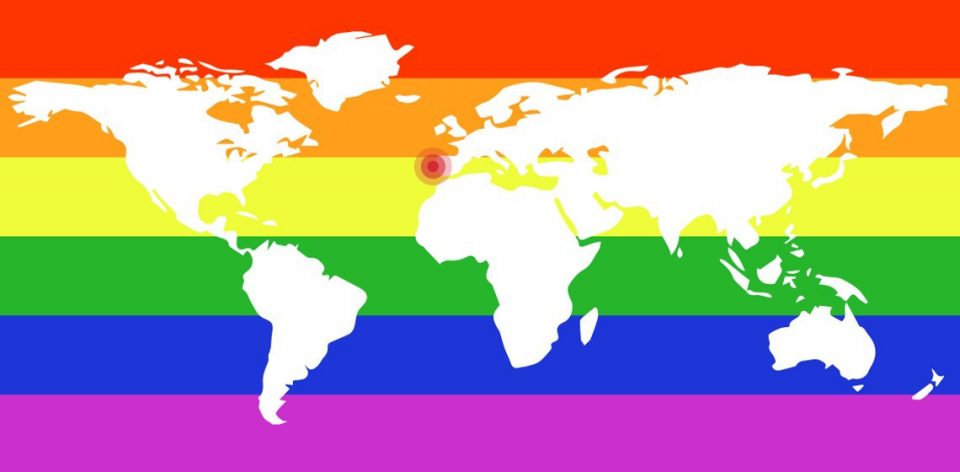To at least virtually escape from our quarantine, we are flying somewhere warm and beautiful for our next interview. Let us check out Lisbon and Portugal through the eyes of Noémia.
Can you introduce yourself please?
My name is Noemia Santos and I'm a cis lesbian activist from Portugal. I'm a Biology undergraduate who hasn't had the chance to complete her Bachelor's degree, but has had significant education in Genetics and Developmental Biology - which I find extremely useful to counter bigotry rooted in scientific misinformation.
I'm involved as much as I can with general LGBTQIA+/queer activism in Portugal, and more particularly within the asexual and aromantic communities. Although asexuality and aromanticism are my main area of social work, the identity that resonates the most with me, and that I am more likely to proactively reveal myself as, is “Lesbian”. I’m very open about it, not only because I have the need to be genuine with myself and others, but also because it is a political statement against a heavily patriarchal society. I think that misogynistic and transmisogynistic values are so pervasive that most people are blind to them, so it’s very important for me to publicly out myself as someone who is not on the same wavelength. I am not okay with a cis-hetero-mono-normative society.

Impressive intro, thank you! How would you summarize the general situation of the LGBTQ+ community in Portugal?
I'd say Portugal has taken a lot of steps in the right direction. Namely, we were one of the first countries in Europe to legalise same-sex marriage, in 2010. Since 2016, Portuguese law has also allowed adoption of children by same-sex couples, even though it's a little bit trickier to put it in practice. Unfortunately, this is speaking in legal terms and doesn't directly translate into societal changes. Portugal has a kind of mentality in which "it's okay - as long as you don't openly display it". So while people aren't often directly persecuted, they are encouraged to "stay in the closet" (at least, socially).
This is very likely related to the fact that Portugal spent 41 years (1933-1974) in a far-right dictatorship. This dictatorship had an active political police, so people were encouraged to silence themselves regardless. Being closed-off from the outside world for so long also resulted in a lot of the country being narrow-minded, despite being recognised as one of the "most LGBT-friendly countries in the world". Which I don't doubt it is, but it's mostly in the capital, Lisbon. The farther away you move from Lisbon, the more likely you are to encounter some friction. It is especially so due to the current rise of the far-right into Parliament.
So, I’d say that, while we’ve made great strides, socially, we are at a point where fighting for our rights and social justice has become much more important. I also feel that a lot of our activism is flawed and pervaded with transmisogyny, capitalism, and anti-sexwork mentalities. There can’t be true feminism when it actively excludes the people we are trying to help. We’re supposed to give a voice to the oppressed, and we’re not doing that by denying people the safety of being who they are and doing what they do. Until Portuguese activism addresses this corruption that exists at its core, we can never move forward.

I can feel your passion about it as you are speaking. Now tell me more about Lisbon please.
I was born in Lisbon and, whilst I studied and currently work there, I've never actually lived in Lisbon itself but rather in its outskirts. It still holds the status of "Hometown" in my heart, though, since it's a city I know and love. It has warmed my heart to see how much Pride events have grown, in the 6 years I have attended them and, the thing that warms it the most is how much more young people have started attending it. You see many teenage couples proudly marching, as well as older couples, and individuals of all ages and identities marching with us. What I see is that, while they try to silence us and our presence, we are fighting back. We will not live in the shame they try to cloak us in. But they still try to.
As I’ve said before, bigotry is being legitimised by how public far-right hateful speech is becoming. And whilst, for now, we mostly get looks of reproach, I predict the violence will escalate. I must say that racist and transphobic violence, or violence against sex-workers has never de-escalated, and this makes it twice as important to address it in the future. And while the law expressly prohibits discrimination grounded on parentage, sex, sexual orientation, gender identity, family situation, nationality, ethnic origin or race; one thing is the law, and another is enforcing it. Right now I work in a very LGBTQIA-friendly environment, but most workplaces work in a don’t-ask-don’t-tell environment, and that isn’t, in any way, healthy.

Finally, can you share a memorable coming out story of yours?
Considering I came out in the middle of an argument (which I sincerely advise against), it was also pretty funny: my mother was questioning me about a pretty expensive telephone bill and I ended up exclaiming that I was calling a girl and that I was dating that girl. My mother’s response was “I don’t care who you’ve been calling; look at this phone bill!”. We later talked about it and she told me that her only concern was my happiness, and that she would welcome whoever I found it with into our family.
I must say I do make a point of coming out in the most random of settings. Even at work. I will mention it casually or make a lesbian joke in the middle of a conversation. I will flamboyantly “lesbian myself” into any situation. I believe that making it slip so naturally into a conversation will contribute to make it natural in the future. I have the privilege of being able to do it freely, and many of us don’t. Until then, I’ll do my best to open the path for everyone to find that same freedom.
I do feel the need to say one thing, though: nobody owes anyone their coming out. We do not owe it to our coworkers, our acquaintances, or even our family members. Our identity is our own and, as any other part of our life, it is ours to reveal as we please. Especially if it might put us in danger.

